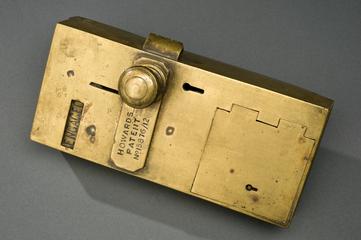
Mini Clubman Car driven by Ed Freeman
- Made:
- 1978-1979 in Longbridge




























An orange Mini Clubman car adapted for use for driver, Ed Freeman, living with impairments caused by the drug compound thalidomide. In order to give more headroom, the floor was lowered and the controls have been adapted, c.1978-1979.
Passing your driving test and buying your first car is often viewed as the first chance at freedom for young people, and this is even more prevalent for disabled drivers. In 1978, for nineteen-year-old Ed Freeman, this Mini provided exactly that. Ed was one of the first people with four limb impairments in the United Kingdom to learn how to drive, so many of the adaptions made to his car were tried for the first time. He had originally wanted a Mini Cooper, but his electric wheelchair would not have fit with the much lower roof. When the car fitters suggested a higher roof, Ed responded with, “There’s no way I’m driving an ice cream van!”, and a compromise was met with the floor being lowered and a ramp being installed.
While cars provided drivers with shortened limbs a new level of freedom, this independence was not felt by everyone. Alongside phocomelia, the medical term for shortened limbs, thalidomide can affect people’s vision, meaning that some people would never be able to drive.
Ed Freeman was one of at least 500 children in Britain born with impairments caused by thalidomide. His mother had pneumonia while pregnant with him, and took thalidomide to help her sleep on medical advice. After just two tablets, her hands started to tingle so she stopped. Unknown at the time this caused impairments to Ed. He and his family continue to be active in the Thalidomide Society, campaigning for people living with thalidomide impairments and their families. Ed is a father to two children, stepfather to two further children and a graphic artist.
Thalidomide was a compound found in drugs prescribed to people in the late 1950s and early 1960s. Although today it is associated primarily as a treatment for pregnancy related nausea, it was also prescribed to anyone experiencing symptoms of colds, flu, headaches, anxiety, and insomnia. Thalidomide causes nerve damage in the hands and feet of adults, but when taken in early pregnancy it causes impairments such as limb difference, sight loss, hearing loss, facial paralysis, and impact to internal organs. One tablet is enough to cause significant impairments. Researchers later identified that there was a link between the impairment a person is living with, and which day of the pregnancy thalidomide was taken. UK distributors withdrew the drug in 1961 and a government warning was issued in May 1962.
Details
- Category:
- Public Health & Hygiene
- Object Number:
- 2003-6
- Materials:
- fibreglass
- Measurements:
-
overall: 1400 mm x 1600 mm x 3460 mm,
- type:
- car and thalidomide
- credit:
- Mr. Ed Freeman




